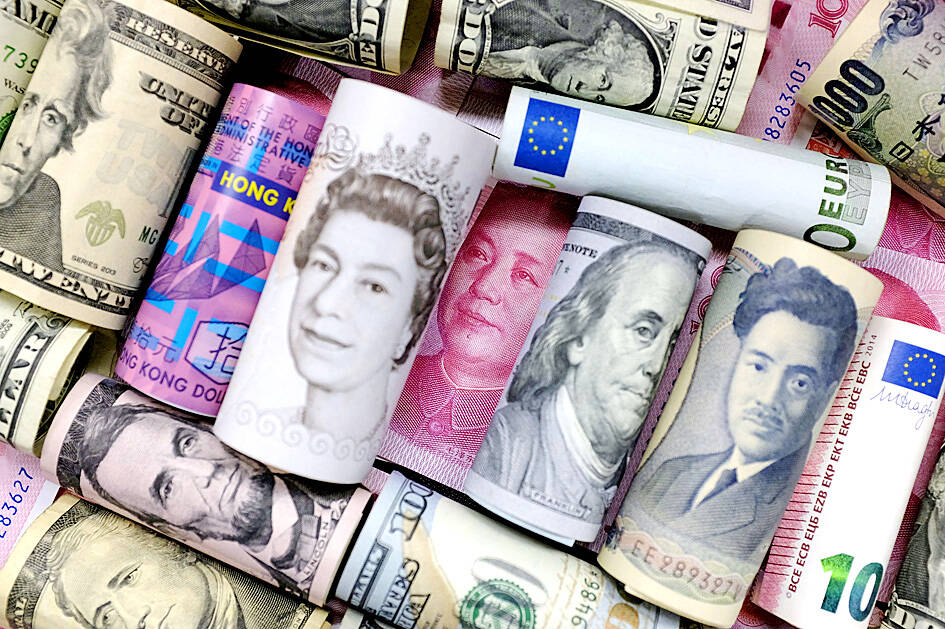The nation’s foreign exchange reserves last month decreased by US$1.08 billion to US$567.02 billion, the central bank said in a statement yesterday.
Foreign exchange reserves have fallen for four consecutive months, as the net outflow of foreign capital offset returns from the bank’s management of reserve assets, data showed.
Exchange rate shifts of other reserve currencies against the US dollar and the central bank stepping in to slow the local currency’s depreciation were also factors behind the decrease in foreign exchange reserves, the bank said.

Photo: REUTERS
Based on the bank’s tallies, the euro fell 0.65 percent against the US dollar last month on a monthly basis, the pound declined 0.6 percent, the Canadian dollar dropped 1.03 percent and the yen shed 3.47 percent.
However, the Australian dollar rose 0.34 percent and the yuan strengthened 0.08 percent against the greenback, the bank’s data showed.
The central bank said it intervened last month to slow the effect of volatile capital flows on the New Taiwan dollar, which ended the month down 1.66 percent against the US dollar.
Due to price corrections, the market value of securities investments and deposits held by foreign portfolio investors fell to US$713 billion last month, equivalent to 126 percent of foreign exchange reserves, compared with US$729 billion and a ratio of 128 percent the previous month, the bank said.
Foreign fund outflows totaled US$7 billion last month according to the central bank measure, and about US$1.3 billion based on the Financial Supervisory Commission’s (FSC) tallies, with the disparity due to the central bank including profit remittances abroad in its data.
Amid geopolitical and macroeconomic concerns, foreign investors have over the past few months reduced their holdings in emerging markets, including Taiwanese equities, the FSC said in a separate report.
Foreign investors sold a net NT$138.89 billion (US$4.29 billion) of local shares last month after a net selling of NT$41.18 billion in March, the commission said.
Overall, foreign investors net sold NT$70.21 billion of Taiwanese equities in the first four months of the year, the commission said.
Taiwan still registered foreign fund inflows of NT$13.92 billion in the first four months, the highest for the same period in five years, it said.

Semiconductor business between Taiwan and the US is a “win-win” model for both sides given the high level of complementarity, the government said yesterday responding to tariff threats from US President Donald Trump. Home to the world’s largest contract chipmaker, Taiwan Semiconductor Manufacturing Co (TSMC, 台積電), Taiwan is a key link in the global technology supply chain for companies such as Apple Inc and Nvidia Corp. Trump said on Monday he plans to impose tariffs on imported chips, pharmaceuticals and steel in an effort to get the producers to make them in the US. “Taiwan and the US semiconductor and other technology industries

SMALL AND EFFICIENT: The Chinese AI app’s initial success has spurred worries in the US that its tech giants’ massive AI spending needs re-evaluation, a market strategist said Chinese artificial intelligence (AI) start-up DeepSeek’s (深度求索) eponymous AI assistant rocketed to the top of Apple Inc’s iPhone download charts, stirring doubts in Silicon Valley about the strength of the US’ technological dominance. The app’s underlying AI model is widely seen as competitive with OpenAI and Meta Platforms Inc’s latest. Its claim that it cost much less to train and develop triggered share moves across Asia’s supply chain. Chinese tech firms linked to DeepSeek, such as Iflytek Co (科大訊飛), surged yesterday, while chipmaking tool makers like Advantest Corp slumped on the potential threat to demand for Nvidia Corp’s AI accelerators. US stock

SUBSIDIES: The nominee for commerce secretary indicated the Trump administration wants to put its stamp on the plan, but not unravel it entirely US President Donald Trump’s pick to lead the agency in charge of a US$52 billion semiconductor subsidy program declined to give it unqualified support, raising questions about the disbursement of funds to companies like Intel Corp and Taiwan Semiconductor Manufacturing Co (台積電). “I can’t say that I can honor something I haven’t read,” Howard Lutnick, Trump’s nominee for commerce secretary, said of the binding CHIPS and Science Act awards in a confirmation hearing on Wednesday. “To the extent monies have been disbursed, I would commit to rigorously enforcing documents that have been signed by those companies to make sure we get

UNUSUAL TIMING: The success of DeepSeek has prompted a scramble among its domestic competitors to upgrade their own AI models Chinese technology company Alibaba Group Holding Ltd (阿里巴巴) yesterday released a new version of its Qwen 2.5 artificial intelligence (AI) model that it said surpassed the highly acclaimed DeepSeek-V3. The unusual timing of the Qwen 2.5-Max’s release, on the first day of the Lunar New Year when most Chinese people are off work and with their families, points to the pressure Chinese AI start-up DeepSeek’s (深度求索) meteoric rise in the past three weeks has placed on not just overseas rivals, but also its domestic competition. “Qwen 2.5-Max outperforms ... almost across the board GPT-4o, DeepSeek-V3 and Llama-3.1-405B,” Alibaba’s cloud unit said in